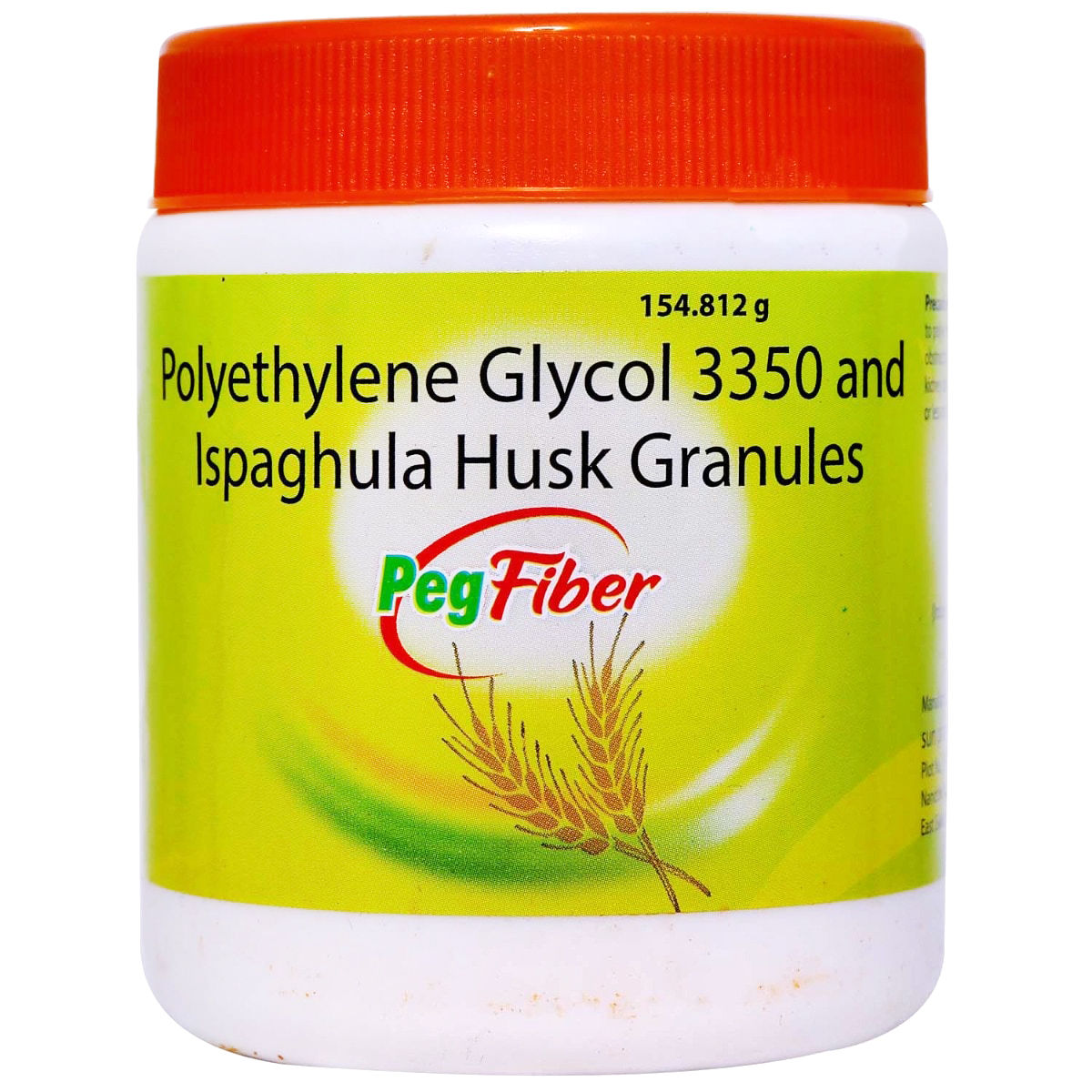POLYETHYLENE GLYCOL+ISPAGHULA HUSK
About POLYETHYLENE GLYCOL+ISPAGHULA HUSK
POLYETHYLENE GLYCOL+ISPAGHULA HUSK belongs to a class of drugs called laxatives used to treat constipation. Constipation refers to infrequent bowel movements in which the stools are often dry, painful, and hard to pass.
POLYETHYLENE GLYCOL+ISPAGHULA HUSK is a combination of two drugs, namely: Polyethylene glycol and Ispaghula husk. Polyethylene glycol draws water into the intestine and softens stools making it easier to pass. Ispaghula husk works by absorbing water and making stools soft and bulky. Together, POLYETHYLENE GLYCOL+ISPAGHULA HUSK helps in relieving constipation.
Take POLYETHYLENE GLYCOL+ISPAGHULA HUSK as advised by your doctor. In some cases, you may experience stomach pain, diarrhea, flatulence (gas), nausea, or bloating. Most of these side effects of POLYETHYLENE GLYCOL+ISPAGHULA HUSK do not require medical attention and gradually resolve over time. However, if the side effects persist or worsen, please consult your doctor.
If you are allergic to POLYETHYLENE GLYCOL+ISPAGHULA HUSK or any other medicines, please tell your doctor. You are recommended to avoid drinks containing caffeine such as coffee, tea, or alcohol as they may worsen constipation and cause dehydration. POLYETHYLENE GLYCOL+ISPAGHULA HUSK is not recommended for children below 12 years of age. If you are pregnant or breastfeeding, please consult a doctor before taking POLYETHYLENE GLYCOL+ISPAGHULA HUSK.
Uses of POLYETHYLENE GLYCOL+ISPAGHULA HUSK
Medicinal Benefits
POLYETHYLENE GLYCOL+ISPAGHULA HUSK contains Polyethylene glycol and Ispaghula husk. Polyethylene glycol draws water into the intestine and softens stools making it easier to pass. Also, it works by cleaning stool from the gastrointestinal tract. Ispaghula husk works by absorbing water and making stools soft and bulky. Together, POLYETHYLENE GLYCOL+ISPAGHULA HUSK helps in relieving constipation by increasing the frequency of bowel movements.
Directions for Use
Storage
Side Effects of POLYETHYLENE GLYCOL+ISPAGHULA HUSK
- Stomach pain
- Diarrhoea
- Flatulence (gas)
- Nausea
- Bloating
Patients Concern
Disease/Condition Glossary
Constipation: It refers to infrequent bowel movements in which stools are often dry, painful, and hard to pass. Constipation is a condition in which the person has fewer than three bowel movements in a week. However, bowel patterns may vary from person to person. Symptoms include bloating, abdominal pain, and feeling as if the bowel movement is incomplete. Constipation occurs when the large intestine's normal muscle contractions slow down, which causes the incomplete elimination of the bowel from the body. Constipation could be associated with a sudden change of diet, a diet with less fiber, not drinking enough liquids, and a lack of exercise.
FAQs
POLYETHYLENE GLYCOL+ISPAGHULA HUSK contains Polyethylene glycol and Ispaghula husk. Polyethylene glycol draws water into the intestine and softens stools making it easier to pass. Ispaghula husk works by absorbing water and making stools soft and bulky. Together, POLYETHYLENE GLYCOL+ISPAGHULA HUSK helps in relieving constipation by increasing the frequency of bowel movements.
POLYETHYLENE GLYCOL+ISPAGHULA HUSK may cause mild diarrhoea as a side effect at the beginning of the treatment. It usually gets better by reducing the amount of POLYETHYLENE GLYCOL+ISPAGHULA HUSK intake. However, if the condition persists or worsens, please consult a doctor.
You are recommended to use POLYETHYLENE GLYCOL+ISPAGHULA HUSK for as long as your doctor has advised it. However, if the condition persists or worsens for more than 3 days, please consult a doctor.
You are recommended to avoid foods that are high in fat and low in fiber such as ice cream, red meat, frozen meals, potato chips, cheese, hot dogs and hamburgers.
You are not recommended to take more than the advised dose of POLYETHYLENE GLYCOL+ISPAGHULA HUSK as it may cause excessive diarrhoea that might lead to dehydration. If you have diarrhoea, stop taking POLYETHYLENE GLYCOL+ISPAGHULA HUSK and drink plenty of fluids to avoid dehydration. However, if the condition persists or worsens, please consult a doctor.


